League to Help Fund HBCU J-Scholarship Foundation
(Homepage photo: Jim Trotter accepts the “Journalist of the Year” award in 2023 at the National Association of Black Journalists convention in Birmingham, Ala. He is flanked by Somara Theodore and DeMarco Morgan, both of ABC News.) (Credit: NABJ)
[btnsx id=”5768″]
Donations are tax-deductible.
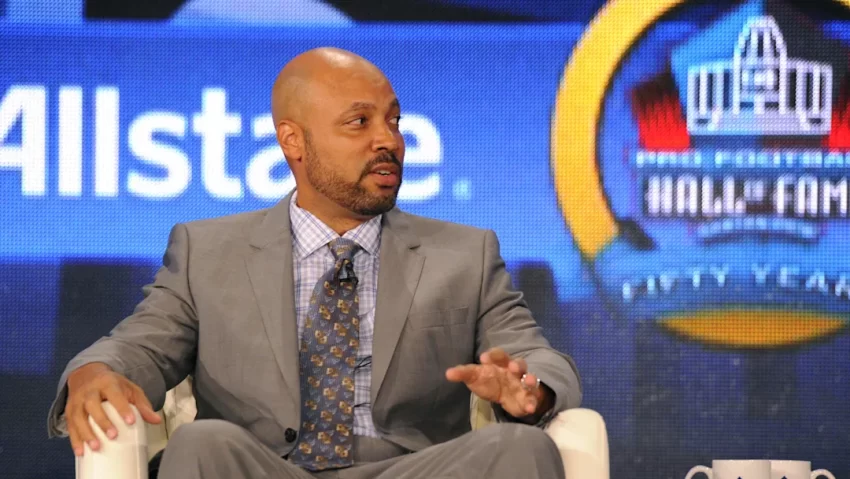
“Rather than focus on the problem, I’m committed to finding solutions,” Jim Trotter said. (Credit: Robert Deutsch/USA Today)
League to Help Fund HBCU J-Scholarship Foundation
The NFL settled a racial discrimination lawsuit with reporter Jim Trotter on Wednesday, just over one year after Trotter sued the league, in exchange for NFL financial support for a scholarship foundation for journalism students at historically Black colleges and universities.
“Terms of the settlement were not publicly known. The NFL did not immediately respond to a request for comment,” Mark Puleo reported for The Athletic, where Trotter now works.
Trotter, a former reporter at the NFL Network, sued the NFL and the league-owned cable channel last year for racial discrimination, claiming that his contract was not renewed “because he repeatedly spoke out about pro football’s lack of diversity at the league office, among its coaches and within its media arm,” as Ken Belson and Katherine Rosman reported then for The New York Times. He also cited offensive remarks by Terry Pegula, owner of the Buffalo Bills, and Jerry Jones, owner of the Dallas Cowboys.
Trotter sought to have a court-ordered monitor put in place to investigate and review the NFL’s policies and implement necessary changes on its hiring, retention and advancement of Black employees throughout its organization.
The lawsuit said NFL Media did not have a single Black person in a managerial position or on its news desk.
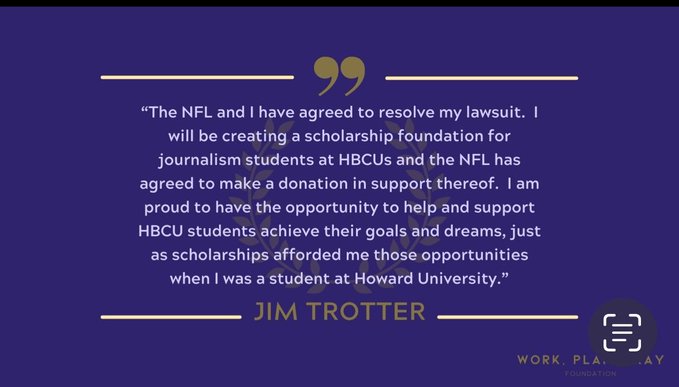
Trotter Wednesday did not discuss the institutional racism he alleged, but he did take to social media to announce his new foundation.
“We all know there’s a lack of diversity in sports media and the front office of athletic teams, particularly in decision-making positions,” he said. “But rather than focus on the problem, I’m committed to finding solutions. To that end, I’ve created the WORK, PLAN, PRAY Foundation, a nonprofit designed to aid students at Historically Black Colleges and Universities with scholarships and resources as they pursue degrees in sports journalism and sports management.
“OUR MISSION
“As someone who has been a professional journalist for nearly four decades, it pains me that more African Americans are not at the table when determining what is a story, who will cover a story, and how a story will be framed — particularly when it involves African American athletes, coaches and executives. Too often, these individuals’ life experiences and cultural experiences are not represented during coverage discussions, which ultimately contributes to a mistrust of the media.”
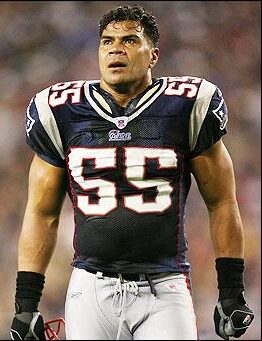 Trotter, named Journalist of the Year for 2023 by the National Association of Black Journalists, said the foundation name was inspired by the late Junior Seau (pictured), whom Trotter covered when he worked for the San Diego Union-Tribune.
Trotter, named Journalist of the Year for 2023 by the National Association of Black Journalists, said the foundation name was inspired by the late Junior Seau (pictured), whom Trotter covered when he worked for the San Diego Union-Tribune.
Seau, a former San Diego Chargers linebacker considered one of the best NFL defensive players of his generation, died by suicide in 2012. Trotter said on the foundation website that Seau “took me under his wing and taught me about the culture of a locker room and the mindset of an elite professional athlete.”
He also explained there why he chose “Work, Plan, Pray” as the foundation name. “Seau was a giving soul who often ended speaking engagements by reminding the audience to work for today, plan for tomorrow, and pray for the rest. I could think of no greater way to thank him and carry on his legacy of giving than by amplifying his words in the name of this foundation.”
Attorney David Gottlieb of Wigdor LLP confirmed the settlement to NBC’s Pro Football Talk, and was as upbeat as Trotter himself about the settlement.
“Jim’s courage and devotion to his principles is self-evident, and it has been an honor to represent him,” Gottlieb said in a statement. “Jim should be applauded for using this opportunity to create a charity with the mission of helping Black sports journalism students and creating more diversity in his field, consistent with the goals of his lawsuit from the start. Our firm is also providing a contribution to this important charitable endeavor.”

USA Today reported last year, “in a league where men of color make up roughly 75% of the player pool, according to data published by The Institute for Diversity and Ethics in Sport (TIDES) at the University of Central Florida, there remains a gap between the diversity of players and the coaches leading them. There are reasons for optimism, however. . . . ” (Credit: USA Today)
Since the suit was filed, Richard Lapchick, who has for years reported sports diversity statistics regarding both teams and journalists to the Associated Press Sports Editors, wrote that the NFL had improved.
“The NFL has taken a lot of criticism for its diversity and inclusion efforts, especially in the past few years, as the number of African American head coaches has stagnated,” Lapchick wrote last December.
“The results in that category still leave a lot to be desired, but overall, the 2023 NFL Racial and Gender Report Card released by The Institute for Diversity and Ethics in Sport (TIDES) at the University of Central Florida (UCF) reflects the best grades ever for the league. The NFL received a B+ for racial hiring practices (86.2%, up 1.2 percentage points), a B for gender hiring practices (84.0%, up 2.6 percentage points) and an overall combined grade of B+ (up from 83.2% in 2022 to 85.1%).”
Another 2023 survey, from USA Today, showed, “NFL coaching staffs are growing more diverse — but not at every position, nor on every team.“
A USA Today series “has explored where coaches of color get stuck in the pipeline, a brief history of Black coaches and how hot non-white head coaching candidates can go cold,” Tom Schad and Jim Sergent reported last November.
Mike Florio suggested for Pro Football Talk why a settlement would be appealing to both Trotter and the NFL
“While the terms are and will remain confidential (which is almost always the case in any piece of employment litigation), we’ll surmise that the NFL made Trotter an offer he couldn’t in good conscience refuse.
“Litigation contains plenty of uncertainty, expense, and delay. And even if/when you win (say, for example, a $4.7 billion verdict), you can still lose (say, for example, when the judge throws out the verdict a month later).
“It becomes a business decision, for both sides. For Trotter, who was committed to exposing an underbelly that usually remains tucked safely behind The Shield, it surely took more than ‘nuisance value’ to get him to stand down.
“For the NFL, which faced a rash of depositions and discovery requests that might have proven Trotter’s theory that he became persona non grata when he opted to press Commissioner Roger Goodell — twice — at Super Bowl press conferences about representation issues in the newsroom, it made sense to buy certainty. And to avoid what would have been, win or lose, a certainly embarrassing trial. . . .”
Oct. 10 update: Tareia Williams, who chairs the Sports Task Force of the National Association of Black Journalists, said, “Although due to an unfortunate situation, we are pleased that this has come to a resolution. Jim is a fantastic voice in this industry and now he can help support HBCU students with the resources they need to become the next and best voices writing and covering the important stories from their perspective.”
Coates Says Issue Is Whose Views Are Heard
October 8, 2024
The full Ta-Nehisi Coates episode of “What Now? with Trevor Noah” debuts Oct. 10. (Credit: YouTube)
Author Indicates ‘Objectivity’ Talk Misses His Point
A day after CBS news executives rebuked “CBS Mornings” co-host Tony Dokoupil over his questioning of author Ta-Nehisi Coates on his denunciation of Israeli treatment of Palestinians, Coates said the issue is not what some would call the co-host’s lack of “objectivity,” but the diversity of views permitted on major media.
“I do think it’s really important to broaden the frame from the few people that were there, and talk about what was actually excluded and who was actually excluded from that conversation by the very structure itself. I just don’t want to lose sight of that,” Coates said on “Democracy Now!”
“I don’t really have a problem with a tough interview. You know, I knew what I wrote. You know, I knew I’d be confronted. You know, was he rude? Was he aggressive? You know, like, I can’t really get into that. Like, it’s not really something that I think too much about.
“The question I would ask, though, is: How often on CBS, on NBC, on ABC, or on any major news organization, do you see someone who is a defender of the Israeli state project get confronted in that kind of way, given a tough interview in that kind of way?
“When was the last time you saw, for instance, a defender of Israel, a defender of Zionism confronted with the fact that major human rights organizations say that Israel is practicing apartheid? How do you defend that? When is the last time you’ve seen an interviewer, how often do you see interviewers — because I don’t want say it never happens — how often do you see interviewers say, ‘Listen, we have the former head of Human Rights Watch that says you are practicing genocide right now in Gaza. How do you respond to that?’ How often do you — how often do you see that? How often do you see, ‘How do you define yourself as a democracy when fully half the people under your rule are not equal?’ ”
As Brian Stelter and Hadas Gold reported for CNN, “Coates, a National Book Award winner, released ‘The Message’ last week, in which he portrays Israel’s treatment of Palestinians as a moral crime, one that many Americans can’t or won’t face directly.
‘“For as sure as my ancestors were born into a country where none of them was the equal of any white man, Israel was revealing itself to be a country where no Palestinian is ever the equal of any Jewish person anywhere,’ Coates wrote.
“During the September 30 interview, Dokoupil took issue with Coates’ framing in the book.
“ ‘I have to say, when I read the book, I imagine if I took your name out of it, took away the awards, the acclaim, took the cover off the book, publishing house goes away, the content of that section would not be out of place in the backpack of an extremist,’ Dokoupil said to Coates.”
Stelter and Gold added that “Multiple correspondents and producers felt that Dokoupil betrayed bias toward Coates, and some suggested Dokoupil had a history of charged on-air comments about the Israeli-Palestinian conflict. Dokoupil has written publicly about converting to Judiasm and has said publicly that two of his children along with his ex-wife live in Israel.
“In wake of the criticism, CBS News and Stations president and CEO Wendy McMahon and her top deputy Adrienne Roark enlisted the network’s standards and practices unit to conduct a review of the discussion, according to sources familiar with the matter. The news division’s race and culture unit was involved as well.
“Management concluded that ‘the problem was Tony’s tone’ in the interview, one of the sources said.
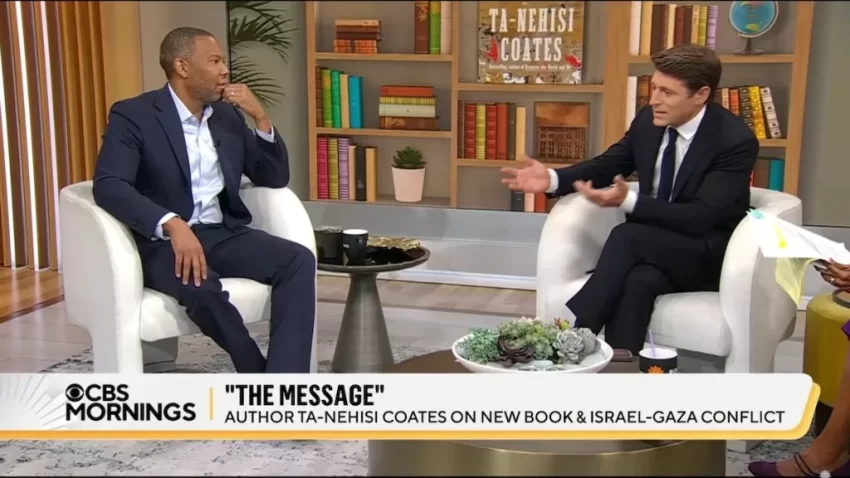
Ta-Nehisi Coates said on “Democracy Now!,” “you have to imagine a world where a Palestinian American journalist could be on a mainstream show like CBS This Morning and confront someone who wrote a book that, say, defended Israel or defended Zionism with that kind of aggression. It’s fine if I get it, but I want to live in that world, too, you know?”
In Monday’s editorial meeting, CBS executives addressed the matter without calling out Dokoupil by name, Joe Flint and Jessica Toonkel reported Monday for the Wall Street Journal.
“This goes way beyond one interview, one comment, one story. This is about preserving the legacy of neutrality and objectivity that is CBS News,” said Roark, according to a person familiar with the meeting, Flint and Toonkel reported. “Roark added that the network will still report objectively and ask tough questions but, ‘we have to check our bias and opinions at the door.’ ”
Debates over the role of “objectivity” are not new, nor is the accusation that the news media, in line with U.S. government policy, are more pro-Israeli than pro-Palestinian.
The claims were heard again last fall when MSNBC dumped progressive Mehdi Hasan’s program. The show averaged around 400,000 viewers a night, making it one of the lower-performing shows on the network, according to Politico. Yet Hasan’s fans were vocal. “The news came as MSNBC has faced scrutiny for its treatment of Muslim on-air personalities since the outset of Israel’s war with the Palestinian militant group Hamas,” Politico’s Eric Bazail-Eimil reported.
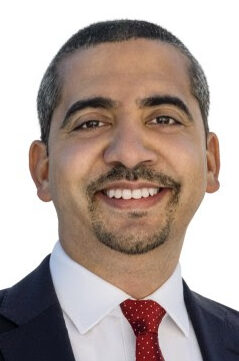 Status’ Oliver Darcy asked Hasan (pictured) on Sept. 22, “Why do you think so many journalists in recent years have opted to strike out on their own?”
Status’ Oliver Darcy asked Hasan (pictured) on Sept. 22, “Why do you think so many journalists in recent years have opted to strike out on their own?”
Hasan replied, “The main reason is that the mainstream industry is no longer hospitable to them for various reasons. Whether it’s financial reasons or ideological reasons. People find themselves unable to say what they want to say or do what they want to do within the confines of corporate media.”
In reports published Monday, comedian Trevor Noah and journalism ethics arbiter Kelly McBride each took aim at what they considered Dokoupil’s lack of objectivity — a concept sharply questioned in journalism circles over the last few years.
The all-day Democracy Summit Tuesday at Howard University discussed oligarchy and “the growing oligarchic forces that are overtaking both of our political parties,“ how they influence the media and how journalists should report on them. The event was livestreamed. (Credit: YouTube)
As recently as Tuesday, “1619 Project” creator Nikole Hannah-Jones began an all-day “2024 Democracy Summit” at Howard University by disparaging the idea, saying that “journalists can’t be neutral when it comes to democracy . . . our ethos must be truth, not a false sense of balance where balance doesn’t exist in an unbalanced political system.” The conference was sponsored by the Hannah-Jones-led Center for Journalism & Democracy.
Noah begins a three-minute trailer for the next episode of his podcast ‘What Now? with Trevor Noah’ by asking Coates about the CBS interview. The comedian starts by relaying to Coates his own anger at the tone and line of questioning Dokoupil aimed at the author over his writings about the Israel-Palestine issue. ‘I very seldom get angry on people’s behalf, but man, we haven’t been able to stop talking about the CBS interview,” Noah said. ‘I don’t think you understand the shockwave that interview created, not because of what you said, but because of the way people felt like you were treated.”
Noah zeroed in on one particular moment from the CBS interview, when Dokoupil said to Coates: “When I read the book, I imagine if I took your name out of it. Took away the awards and the acclaim. Took the cover off the book, the publishing house goes away. The content of that section would not be out of place in the backpack of an extremist.”
“ ‘Yo!’ Noah said of Dokoupil’s comments. ‘I don’t get flabbergasted by much, I genuinely don’t. I sat there, and I was like, what?’
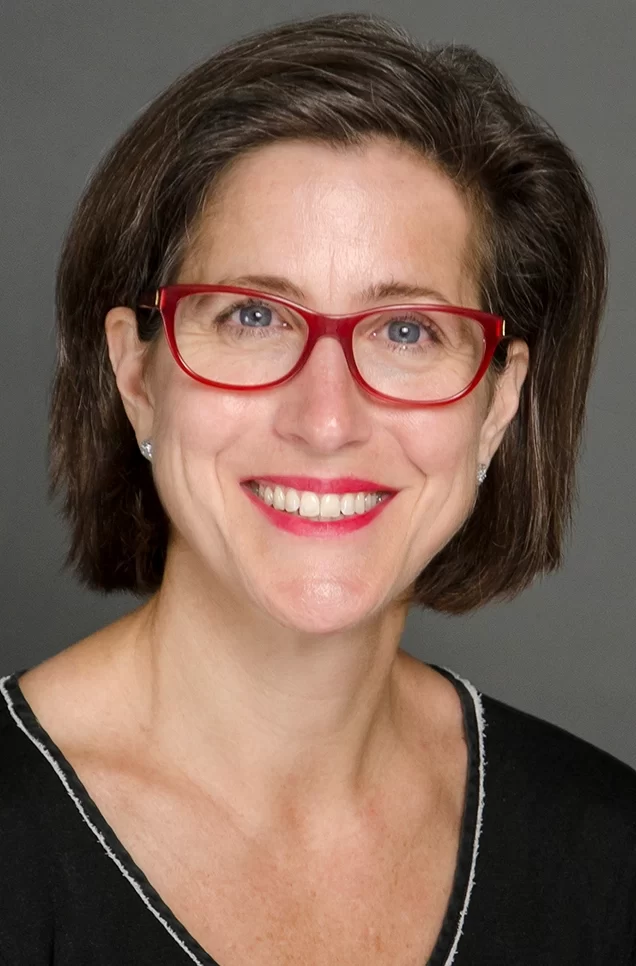 The independent Jewish newspaper the Forward reached out to McBride (pictured), head of Poynter’s Craig Newmark Center for Ethics and Leadership.
The independent Jewish newspaper the Forward reached out to McBride (pictured), head of Poynter’s Craig Newmark Center for Ethics and Leadership.
“McBride, who said she had already watched the interview multiple times, said that while Dokoupil had helped deliver an unusually deep conversation for morning television, he had also asked ‘gotcha’ questions that would turn off some viewers.
“ ‘He could have simplified his questions and had a better discussion — a more informative discussion,’ McBride said. ‘And that probably would have made the conversation more accessible to a wider group of people.’ “
However, the Forward’s Louis Keene also wrote, “McBride said she thought that in spite of the questions, Coates ‘knocked it out of the park’ in the interview. ‘It really was one of the most interesting conversations I’ve seen on morning television,’ she said.
“Clearly, the CBS Mornings piece was a compelling watch. A clip of the segment has 27 million impressions on X since its posting last week, according to the site’s metrics. So I asked McBride whether Dokoupil’s tactics might be justified in retrospect, notwithstanding the internal firestorm at CBS. . . .”
“The short answer was no. ‘You would have gotten better results if you had been better at the craft,’ she said.
“ ‘The greatest common good is what we’re after in journalism,’ McBride said. ‘So with an interview like that, you want the greatest number of people to walk away from that conversation feeling enlightened.’ While Dokoupil’s approach reflected the perspective of a staunch supporter of Israel, she said, ‘everybody else was left out of that conversation because of the way he framed his questions.’ ”
- Michel Martin, “Amanpour and Company,” PBS: Ta-Nehisi Coates on Visit to Israel/West Bank: “An Immoral Apartheid Regime” (video)
- Alex Weprin, Hollywood Reporter: Shari Redstone Backs Tony Dokoupil Amid Fallout Over CBS’ Ta-Nehisi Coates Interview (Oct. 9)
“What’s going on?” asked a questioning Elinor Tatum as Editor & Publisher’s Mike Blinder told her that some of his colleagues were in the Amsterdam News offices and on the unusual Zoom call.
Elinor Tatum Named E&P Publisher of the Year
Editor & Publisher magazine surprised Elnor P. Tatum in person and by Zoom Monday at her Harlem, New York, office by announcing her selection as its Publisher of the Year.
She will thus be the first Black female publisher to be featured on its cover in the publication’s 140-year history, E&P Publisher Mike Blinder told her.
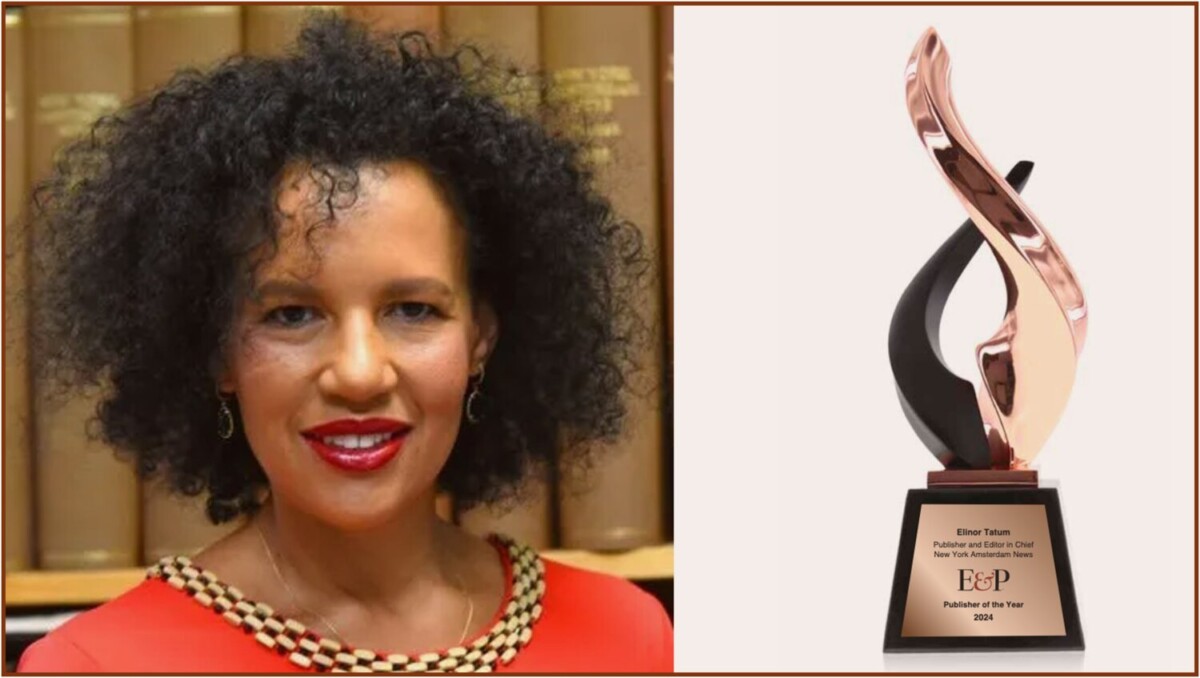 “Today, Amsterdam News has one of the fastest-growing and largest digital readerships of any legacy Black newspaper,” the publication reported. “Their journalism excellence has garnered them more than 30 journalism and industry awards in the past three years. At a time when many outlets are experiencing layoffs and cutbacks, Tatum has added two editors, four journalists and countless interns to its newsroom.
“Today, Amsterdam News has one of the fastest-growing and largest digital readerships of any legacy Black newspaper,” the publication reported. “Their journalism excellence has garnered them more than 30 journalism and industry awards in the past three years. At a time when many outlets are experiencing layoffs and cutbacks, Tatum has added two editors, four journalists and countless interns to its newsroom.
“Always committed to racial justice journalism, Tatum, along with her executive editor, Damaso Reyes, fulfilled a long-held mutual dream of launching the first-ever investigative unit in a legacy Black newspaper — the award-winning ‘Blacklight.’ Blacklight garnered an ever-increasing number of awards while delivering critically needed journalism to the readership of [the] New York Amsterdam News. Blacklight’s investigations provide its readers with investigative reporting on gun violence in Black and Brown communities, information about the impact of climate change on communities of color and much more.
“Tatum played a crucial role in creating ‘Word In Black’ with her colleague Black publishers nationwide and the Local Media Association. This historic collaboration between 10 legacy Black publishers has produced award-winning original journalism, as well as providing much-needed revenue for its members. . . .”
Tatum, 53, is the daughter of Wilbert and Susan Tatum, her father a former publisher and chief executive officer of the Amsterdam News. After he died in 2009, Tatum assumed full control of the newspaper.
Robin Blinder, E&P editor in chief, told Journal-isms that she could not be sure whether a Black man had been on its cover, but “We don’t believe so. We only own the archives since 2017, so we can’t be sure. We are just so thrilled to honor Publisher Tatum who has worked so tirelessly for a legacy Black publication. Long time coming, and now we need our first Black male publisher.”
- Isheka N. Harrison, Moguldom Nation: The Legacy Of Black Newspaper Publishing Pioneer New York Amsterdam News (July 18, 2022)
- The HistoryMakers: Elinor Tatum
- Nathaniel Popper, the Forward: Why’s a Jewish Woman Running a Black Paper? (March 4, 2009)
Breaking a Barrier: An Asian American Columnist at Bob Maynard’s Oakland Tribune
October 7, 2024
Reader Response Was, as Expected, Good and Bad
CBS Faults ‘Mornings’ Interview of Ta-Nehisi Coates
[btnsx id=”5768″]
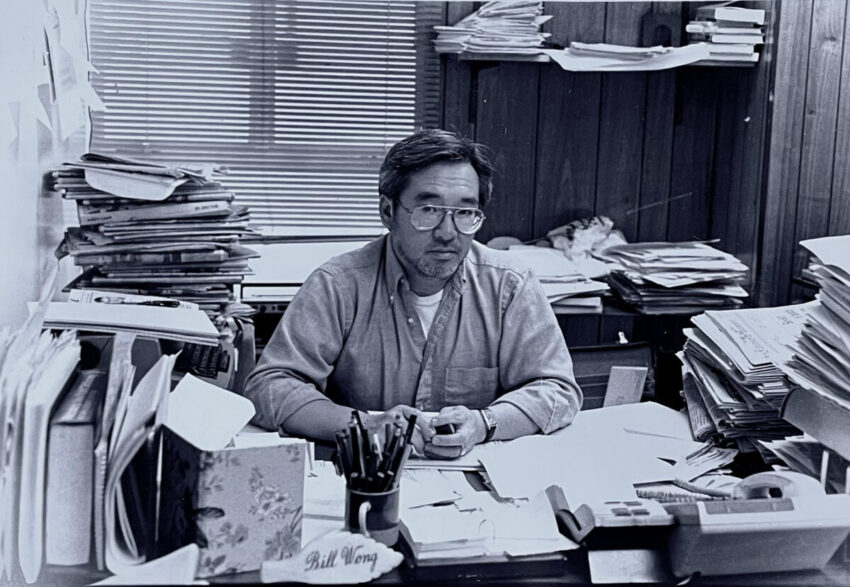
William Gee Wong at the Oakland Tribune in late 1980s or early 1990s. (Credit: Ron Kitagawa)
Reader Response Was, as Expected, Good and Bad
No account of the struggle to achieve diversity in the news business would be complete without the story of Robert C. Maynard, the first African American editor and owner of a major daily newspaper in the United States, the Oakland (Calif.) Tribune.
Maynard was a trailblazing journalist who co-founded what is now the Maynard Institute for Journalism Education with his wife, Nancy Hicks Maynard, and together they and their team led efforts to desegregate newsrooms and educate students of color to pursue careers in journalism.
African Americans were just 2 percent of newspaper employees in 1978, few in decision-making roles, and two-thirds of the nation’s papers had no employees of color, according to a survey by the American Society of Newspaper Editors.
The Maynards wanted to eliminate from the lexicon the excuse “can’t find anybody qualified.” They had a chance to implement the practices they preached when the Gannett Co. sold the money-losing Oakland Tribune to the couple in 1983. Bob Maynard had been editor since 1979.
Then, as now, Oakland was multicultural. Today, the city is 32.3 percent white alone; 15.9 percent Asian alone, 28.6 percent Hispanic alone, and 21.8 percent Black or African American, according to U.S. Census population estimates for 2023. The estimates also include smaller percentages of people of two or more races, American Indians, Alaska Natives, Native Hawaiians and other Pacific Islanders.
Into this mix arrived William Gee Wong, an Oakland native and Chinese American who wrote for the Wall Street Journal as well as the San Francisco Chronicle, San Francisco Examiner and Asian American periodicals. In his recent memoir, “Sons of Chinatown: A Memoir Rooted in China and America,” excerpted below, Wong describes what it was like to be the first Asian American columnist at the Maynards’ Oakland Tribune. He joined the paper from the Wall Street Journal in 1979. He was the Tribune’s business editor and reader’s representative before becoming a columnist in 1988.
The journalistic efforts of Wong and others weren’t able to save the Tribune, which the Maynards sold in 1992, but during their time there, Tribune columnist Tammerlin Drummond wrote, “It was a gutsy, scrappy newspaper that reflected its community,” though “The Tribune always operated on a shoestring and the goodwill of its devoted employees.” In 1990, the newspaper won a Pulitzer Prize for photography for coverage of the Loma Prieta earthquake.
This video was made as part of the Oakland History Murals project by Bay Area history teacher Mike Burton. It was provided by the Maynard Institute when Robert Maynard received the Freedom Forum’s Free Spirit Award posthumously in 1994. (Credit: YouTube)
By William Gee Wong
Robert C. Maynard was an affable yet arrogant man, brilliant, charismatic, effusive, and full of himself, yet charming. He dressed stylishly, in well-starched English-made dress shirts, colorful silk ties, and well-tailored dark suits. He spoke precisely in a deep, low cadence, punctuated by an occasional grin or sly smile.
He got your attention. His weekly column was elegantly written, often with an uplifting moral message. He gained national recognition as a frequent guest commentator on ABC-TV’s “This Week with David Brinkley” show. He was quite a contrast to my more introverted, much less fashionable, and decidedly uncharismatic persona.
Sometimes, being in his presence could be intimidating and overwhelming. I was mildly shocked the first time we had lunch together in Chinatown. He ordered in Mandarin, which I didn’t speak. I hid my personal shame. Here I was, the Chinatown Chinese guy, who couldn’t do what this outgoing, smart Black guy could, right there in my own Chinatown! Nonetheless, we had convivial conversations over delicious food, and I found him relaxed and personable.
As his status and power grew — from mere editor-in-chief to publisher to owner — our relationship became more distant, but still cordial. . . .
The paper’s financial troubles were rooted in the reluctance of traditional advertisers (big retailers, car companies) to support a newspaper that had a thin middle-class and upper-middle-class readership who wasn’t largely white. Its suburban competitors had that financially more desirable market now.
After the initial high of joining the Gannett family, the excitement of Maynard’s appointment, and the splashy East Bay Today debut, many of us worker bees became increasingly stressed as the paper was dangerously teetering.
Rumors swirled about the paper’s imminent demise. The union representing newsroom employees made concessions on wages and working conditions to help keep the paper afloat.
More than once, I sought newspaper jobs elsewhere. Colleagues did the same or simply quit. I went to Portland, Oregon, to interview for an editing job at the Oregonian. Nothing came of that. The San Francisco Examiner wanted me to be its business editor for a small kick up in pay and the promise of a parking space (a precious commodity!), but I decided to stay at the Tribune, for that position wasn’t what I was looking for. My administrative-personnel assistant managing editorship was hardly a personal morale boost.
I did the job, but I wasn’t the happiest camper.
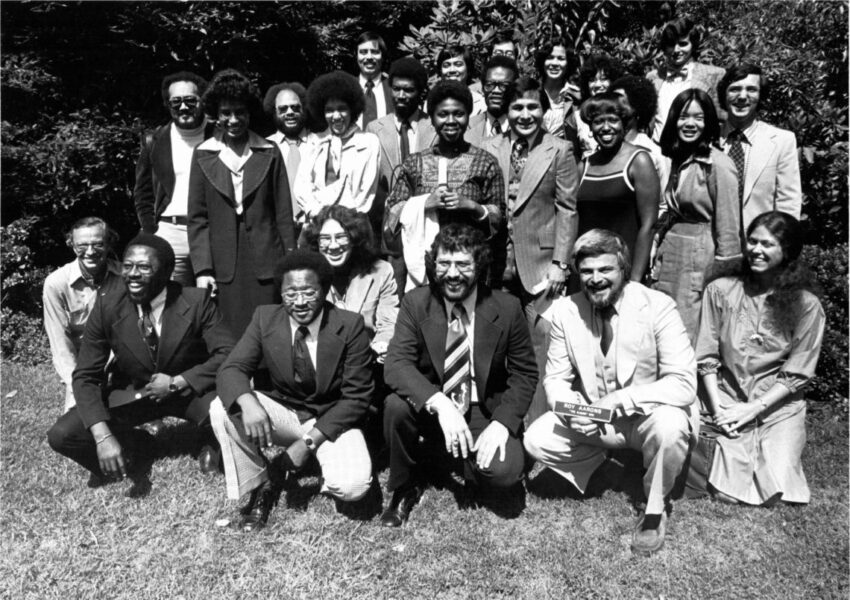
Faculty, staff and reporter-graduates gather after closing ceremonies in 1976 of the Summer Program for Minority Journalists, which had conducted its first training session at the UC Berkeley Graduate School of Journalism. The program then was run by the Institute for Journalism Education, later renamed the Maynard Institute. Robert C. Maynard is at bottom, left, Leroy F. Aarons, who worked with Maynard at the Oakland Tribune as executive editor, is second from right. (Credit: photo by Nikki Arai; courtesy of Frank Sotomayor.)
Then that mythical thought-bubble light bulb illuminated: Why not write a column full-time?
Why not indeed? I approached Maynard and Leroy Aarons [the new executive editor], and they agreed, with Aarons expressing reservations. When I told them that I wanted to include Chinese American and Asian American themes, Aarons questioned its sustainability.
My new column-writing gig didn’t immediately replace my administrative duties. My early columns appeared once every other week on the editorial pages, with my name and photo prominently displayed. My first such column discussed the status of Asian Americans and why President Jimmy Carter had designated nine years earlier an Asian Pacific American Heritage Week. Two weeks later, my second column, headlined “The roots of Asian American crime,” focused on a national conference in Oakland of public officials addressing a growing crime problem in Asian American communities.
Those two columns were a good start to offer my thoughts on topics that were ignored by newspapers like the Tribune and that I was well positioned to address. They began to fulfill a long-term wish of mine to write about “my community” in a mainstream newspaper that had a readership much wider than Chinatown, Chinese America, and Asian America.
A few months later, by mid-September of 1988, my column went weekly. A month later, I made the full transition, with a new title, associate editor, lofty but largely meaningless. More important, my column began running three days a week. I was back to what had energized me about journalism — writing and telling stories.
As a columnist, one has a luxury that reporters don’t. You can express an opinion or a point of view. I saw this column as a perfect opportunity to deepen my racial-ethnic identity search and to highlight topics that were largely hidden from wide public consumption. At the same time, I knew not to write exclusively along racial-ethnic lines. That would be much too limiting and would pigeonhole me. Yet even when yellow ethnic themes formed only a fourth to a third of all my columns, I know that many folks thought of me as an “Asian American” columnist. That label has at least two interpretations: One is descriptive, and the other is limiting.
My mission was essentially twofold: Introduce Tribune readers to topics they had rarely read about but that were intricately interwoven with Oakland life and journalistically explore topics close to my soul. In my eight years of writing columns, I wrote about Oakland’s Chinatown as well as Chinese American and Asian American matters of all sorts.
Most of my Tribune columns, however, weren’t devoted to those specialties. The subjects I addressed were eclectic, from local people and politics to regional, state, national, and international politics and culture, from the personal to perplexing social and cultural issues. For example, I opposed President George H. W. Bush’s Gulf War. I favored sensible gun regulations. I wrote about parenting joys and challenges. I took on arts and cultural matters that intersected with race and class. I highlighted our society’s growing multiculturalism. Sometimes, I engaged a playful, satirical, humorous voice.
A favorite column was published on January 30, 1989. A white Canadian psychologist had made a racially charged presentation at a San Francisco scientists’ convention. His theory was that “Orientals” were superior to white or Black people in intelligence and social organization. His underlying message was that Black people were intellectually inferior. “Orientals” have bigger brains in cranial capacity and brain weight, he said. “That must be why I can’t lose any weight,” I wrote.
Before widespread use of the Internet and such social media platforms as Facebook, YouTube, Twitter, TikTok, and Instagram, being a newspaper columnist raised one’s public profile. Shortly after my columns started running regularly, Nancy Hicks Maynard congratulated me on “beginning to find your voice,” a high compliment from the boss’s wife. A local Asian American activist power couple wrote to Maynard, thanking him for giving me a column. They liked that I wrote widely, not just about Asian American issues.
General reader response was, as expected, good and bad. How readers communicated with a columnist was decidedly old-fashioned — calling on a landline phone or writing a letter on paper and mailing it in with a stamp.
One reader hand-wrote me letters telling me that he hated my stuff, which led me to wonder: Why does this guy continue reading me when he doesn’t like what I have to say? After a column on Oakland political redistricting in which I highlighted the need to consolidate Asian American voters, one reader, “A concerned Black citizen,” wrote, “If Chinese-Asians practiced birth control like everybody else there wouldn’t be — so much population growth and burden on our City. And if the Chinese stayed off the boats and in China where they belong, they would not be here driving up my taxes and trying to take something that belongs to somebody else.”
William Gee Wong published a podcast based on “Sons of Chinatown” in August. (Credit: YouTube)
Following a column about the Los Angeles mayoral race, in which Richard Riordan, a white man, had defeated Michael Woo, a Chinese American, a reader, signing his letter, “East Side White Pride, Oakland CA 94607,” wrote, “You are an Asian racist. You are a hatemonger. You spew all of your poison sewage against whites eternally on the behalf of black activists.”
Among Tribune colleagues, the response to my columns was more muted, nuanced, and indirect.
Some told me directly that they liked what I was doing. One qualified his praise by saying that, in general, columnists don’t hit the mark every time, but he believed that I did so often enough.
One popular reporter, a white guy, liked to josh me about what he thought was my naïveté about a possible harmonious multicultural future that I sometimes conveyed in my columns about California’s and America’s browner demographic future. His edgy but good-natured skepticism was typical of the mind-set of others, I’m sure.
The oddest inside response came from a female reporter and desk editor, who had once worked under my business-editor command and, later, on the city desk. She was a quick, reliable, if opinionated colleague, one I wasn’t particularly close to. After my column had been running a while, she came into my little office, told me that she
liked what I had just written, and promptly walked out.
Later, I heard the gossipy backstory on why she did that. Out of my earshot, she had earlier scoffed at my writing, so she wanted to show those she had complained to that she could, indeed, say something nice about me to my face.
My racially themed columns apparently upset at least one Tribune employee who worked in the basement where the papers were printed. A tall, muscular white man approached me one day, not in a threatening manner, but more in exasperation about what he believed was my antiwhite attitude. We chatted briefly without anger or resolution. At least he didn’t choose to bop me.
Others also didn’t like what I was writing. I regularly parked my car in a lot across from our newsroom. One day, I found nails hammered into the two back tires of my car. That wasn’t accidental.
* * *
From Sons of Chinatown: A Memoir Rooted in China and America by William Gee Wong. Used by permission of Temple University Press. © 2024 by Temple University. All Rights Reserved.
Sons of Chinatown can be purchased from Temple University Press here.
Postscript:
Under the new owners, the Alameda Newspaper Group, Wong was let go in 1996 – an act that triggered loud protests from readers and Asian Americans in the Bay Area. In a previous book, “Yellow Journalist: Dispatches from Asian America,” Wong voiced suspicions that the new owners and their “conservative white editors … did not like my politics and … my writing so often about Asian American issues.” However, the Alameda County Superior Court dismissed a lawsuit by Wong alleging age and racial discrimination and breach of contract.
The newspaper group said the termination was for economic reasons.
- Leonard Chan, Asian American Curriculum Project: An Interview With Journalist and Author William Gee Wong (April 30)
- Bill Drummond, University of California at Berkeley: Celebrating Early Diversity Initiatives at Berkeley Journalism: An Essay by Professor Bill Drummond (Feb. 25, 2022)
- Bruce Lambert, New York Times: Robert C. Maynard, 56, Publisher Who Helped Minority Journalists (Aug. 19, 1993)
- Linda Liu, San Francisco Chronicle: Oakland Chinatown-native journalist pens ‘an illegal immigration success story’ (Aug. 14)
- Kimberley Mangun, Black Past: Robert C. Maynard (1937-1993) (2008)
- Eric Newton, Knight Foundation: Bob Maynard, media diversity, and a story without an ending (Dec. 23, 2013)
Ta-Nehisi Coates joins “CBS Mornings” Sept. 30 to talk about his new book, “The Message,” and about the banning of his work in South Carolina. (Credit: YouTube)
CBS Faults ‘Mornings’ Interview of Ta-Nehisi Coates
“A contentious interview last week on CBS Mornings did not meet the network’s editorial standards,” Alex Weprin reported Monday for The Hollywood Reporter.
“That was a message shared by CBS News brass to staff in an editorial meeting Monday.
“Last week’s interview saw CBS Mornings co-host Tony Dokoupil speak with author Ta-Nehisi Coates about his new book The Message, which passionately argues that Israel’s treatment of Palestinians is immoral and should be condemned.
“The interview was contentious, but civil, with Dokoupil asking pointed questions of Coates like ‘Why leave out that Israel is surrounded by countries that want to eliminate it?’ and comments like ‘I have to say, when I read the book, I imagine if I took your name out of it, took away the awards, the acclaim… the content of that section would not be out of place in the backpack of an extremist.’
“Not surprisingly given the high emotional stakes of anything that involves Israel and Palestine, the interview garnered a strong reaction online, and within CBS News, with some arguing that the tough questions were justified, and others arguing that Dokoupil’s personal views were a factor.
“Ultimately, the tone of Dokoupil’s interview was what warranted a response from CBS News executives Wendy McMahon and Adrienne Roark, who heads newsgathering. The executives told CBS staff that the interview did not meet the network’s editorial standards. . . .”
“Coates himself was asked about the CBS interview by Mehdi Hasan, telling him ‘I was a little surprised, and then I realized what was going on, I was in a fight,’ he said.
“ ‘So it was right there, you know, as a pop quiz, but I had studied,’ he continued.”
-
- Perry Bacon Jr., Washington Post: Why you should read Ta-Nehisi Coates’s new book
[btnsx id=”5768″]
To subscribe at no cost, please send an email to journal-isms+subscribe@groups.io and say who you are.
Facebook users: “Like” “Richard Prince’s Journal-isms” on Facebook.
Follow Richard Prince on Twitter @princeeditor
Richard Prince’s Journal-isms originates from Washington. It began in print before most of us knew what the internet was, and it would like to be referred to as a “column.” Any views expressed in the column are those of the person or organization quoted and not those of any other entity. Send tips, comments and concerns to Richard Prince at journal-isms+owner@
View previous columns (after Feb. 13, 2016).
View previous columns (before Feb. 13, 2016)
- Diversity’s Greatest Hits, 2018 (Jan. 4, 2019)
- Book Notes: Is Taking a Knee Really All That? (Dec. 20, 2018)
- Book Notes: Challenging ’45’ and Proudly Telling the Story (Dec. 18, 2018)
- Book Notes: Get Down With the Legends! (Dec. 11, 2018)
- Journalist Richard Prince w/Joe Madison (Sirius XM, April 18, 2018) (podcast)
- Richard Prince (journalist) (Wikipedia entry)
- February 2018 Podcast: Richard “Dick” Prince on the need for newsroom diversity (Gabriel Greschler, Student Press Law Center, Feb. 26, 2018)
- An advocate for diversity in the media is still pressing for representation, (Courtland Milloy, Washington Post, Nov. 28, 2017)
- Morgan Global Journalism Review: Journal-isms Journeys On (Aug. 31, 2017)
- Journal-isms’ Richard Prince Wants Your Ideas (FishbowlDC, Feb. 26, 2016)
-
Richard Prince with Charlayne Hunter-Gault, “PBS NewsHour,” “What stagnant diversity means for America’s newsrooms” (Dec. 15, 2015)
- Book Notes: Journalists Follow Their Passions
- Book Notes: Journalists Who Rocked Their World
- Book Notes: Hands Up! Read This!
- Book Notes: New Cosby Bio Looks Like a Best-Seller
- Journo-diversity advocate turns attention to Ezra Klein project (Erik Wemple, Washington Post, March 5, 2014)

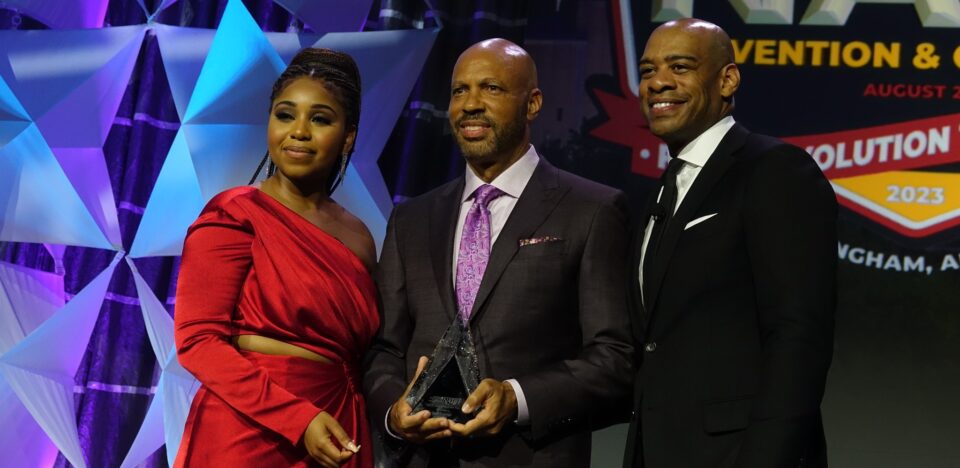
10 comments